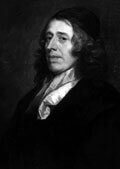the First Week of Lent
Click here to join the effort!
Bible Commentaries
Owen's Exposition of Hebrews Owen on Hebrews
New Testament
Author's Biography
John Owen, born in 1616 in Stadhampton, Oxfordshire, England, stands out as a prominent figure in the 17th-century Puritan movement, an era marked by intense religious and political upheaval. A theologian and academic administrator of profound intellect, Owen's journey was deeply intertwined with the pivotal events of his time, reflecting his commitment to piety and theological rigor.
Owen's educational odyssey commenced at Queen's College, Oxford, where he was admitted at the tender age of twelve. His academic prowess was evident early on, but his dissent from the Anglican Church's rigidity and his alignment with Puritan ideals marked the beginning of his lifelong advocacy for religious reform and tolerance. Owen's refusal to subscribe to the uniformity of the Church of England led to his departure from Oxford, redirecting his path towards the study and practice of nonconformist beliefs.
His career and theological contributions flourished during the tumultuous times of the English Civil War, a period that saw the rise and fall of political and religious factions. Owen's support for the Parliamentarian cause brought him into close association with Oliver Cromwell, under whom he served as chaplain and adviser. This alliance provided Owen with the platform to advocate for religious freedom and to play a crucial role in the reformation of the church.
Owen's tenure as the dean and vice-chancellor of Christ Church, Oxford, further solidified his influence in shaping the educational and religious landscape of the time. His prolific writings, including works on the Holy Spirit, Christology, and ecclesiology, left an indelible mark on Reformed theology. His emphasis on personal piety, the importance of communion with God, and the necessity of religious liberty resonate through his works, such as "The Mortification of Sin" and "Communion with God."
John Owen's legacy endures not only through his theological writings but also through his steadfast commitment to the principles of religious freedom and conscience. His death on August 24, 1683, marked the end of a life dedicated to the pursuit of religious understanding and reform, yet his teachings continue to inspire generations of theologians and believers worldwide.
